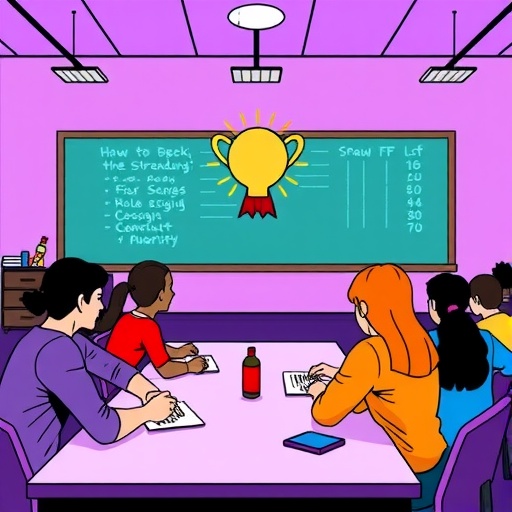Incentive systems grounded in competition have become ubiquitous tools employed by businesses and educational institutions alike, aiming to boost motivation, performance, and overall productivity. These systems frequently mimic contests: the highest achievers—be it in sales, academic performance, or other metrics—are rewarded with bonuses or other forms of recognition. While intuitively effective in galvanizing effort, such competitive frameworks bear complex psychological and social implications that have remained understudied, particularly over the long term.
A groundbreaking investigation led by Professor Fabian Kosse of Julius-Maximilians-Universität (JMU) in Würzburg has now illuminated some profound, lasting effects of prolonged exposure to competitive environments. His research delves into how sustained competition subtly reshapes the prosocial fabric of individuals, specifically young people, by diminishing their willingness to help others and their innate trust in peers. This marks a pivotal step in understanding not only the ephemeral impacts of incentive-based competition but also its deep-seated influence on personality development.
Prior studies have reliably documented short-term drawbacks of competition, noting decreases in cooperation among colleagues and peers. However, Kosse and his team extended this inquiry into the longitudinal domain, analyzing data gathered over multiple years. Their findings reveal a stark and unsettling reality: after two years of intense rivalry, both helpfulness and trust among youth significantly decline. Even more strikingly, these declines persist for at least four years following the cessation of competitive conditions, suggesting a durable imprint on individual behavioral tendencies.
This sustained reduction in prosociality—the inclination to act generously and cooperatively without immediate personal gain—underscores a worrisome duality in competition. While it can temporarily elevate performance, it risks cultivating an environment antithetical to collective well-being and social cohesion. Kosse articulates this conundrum succinctly: prolonged competition does not merely alter situational behavior but reconfigures intrinsic personality traits, reshaping young minds’ dispositions toward others.
The research emerged from a collaboration involving experts from diverse institutions, including Ranjita Rajan of the Karta Initiative in Oxford and Michela Tincani of University College London, lending interdisciplinary depth to the investigation. Their study was meticulously published in the prestigious Journal of the European Economic Association, signaling its significance within economic, psychological, and educational scholarship.
The setting for this compelling study was Chile, a country where robust educational datasets provide fertile ground for empirical analysis. The research exploited a government-implemented program known as PACE, designed to expand university access for socially disadvantaged youth. PACE guarantees university admission to the top 15 percent of students in participating schools, exempting them from the nationwide entrance exam and thereby offering an exceptional incentive to outperform peers over two academic years.
This program engenders a high-stakes competition, not determined by a single examination but by cumulative performance metrics spanning multiple school years. Such an arrangement creates an extended competitive atmosphere, conducive to examining long-term psychological effects. Importantly, the researchers surveyed a comprehensive population, involving 64 PACE-inclusive schools and an equal number of control schools without the program, encompassing over 5,000 students. Random assignment of schools to the PACE or control group ensured experimental rigor, mitigating confounding variables.
Data aggregation involved analyzing both administrative records collected by the Chilean government and specially designed surveys targeting students, teachers, and administrators. Survey instruments measured subjective perceptions of competitive pressure as well as overt prosocial behaviors, including altruism, reciprocity, and trust. Questions probed attitudes like willingness to help others without recompense and perceptions of peer cooperation, providing nuanced quantitative and qualitative insights.
The results painted a disconcerting picture: competition-induced stress and rivalry corrode social trust and helpfulness. These detrimental effects are not fleeting reactions to a competitive context but rather solidify over time, potentially reshaping the social environment and individual interaction patterns in significant ways. Such findings challenge the wisdom of uncritically adopting competition as a motivational tool, especially in formative educational settings where personality trajectories are still malleable.
Faced with these insights, the research team advocates for thoughtful reform in competitive incentive structures. One promising avenue involves broadening the competition pool beyond individual schools to regional aggregates of socially disadvantaged students. This approach could dilute the intense intra-school rivalries by fostering a collective identity and reducing zero-sum dynamics among immediate peers.
Moreover, the researchers suggest reconfiguring competition into cooperative frameworks, where schools compete against one another rather than intra-school individuals. This could generate positive intergroup dynamics—shifting the mindset towards collaboration within schools while inspiring unity across institutions. Such strategies have the potential to preserve performance incentives while mitigating harmful declines in prosocial behavior.
This nuanced understanding of competition’s persistent impact on human behavior pushes the discourse beyond simplistic productivity metrics. It invites policymakers, educators, and corporate leaders to critically evaluate the social cost of their incentive systems. Balancing motivation with the preservation of trust and altruism emerges as a delicate but necessary undertaking for fostering healthier, more cooperative communities.
Professor Kosse’s research thus resonates deeply with broader debates across behavioral economics, psychology, and education policy. It underscores that incentives can shape not only actions but also enduring personality features, with implications extending well beyond the immediate competitive context. As societies grapple with cultivating both excellence and empathy, this study offers vital evidence to guide the design of future incentive programs.
In sum, the work of Kosse and colleagues reveals a fundamental tension between competition and cooperation that lies at the heart of human social dynamics. While competition can spur achievement, it also exacts an often invisible toll on the social psyche, influencing young people’s ability to trust and assist one another long after the contest ends. Recognizing and addressing these persistent effects is crucial for building environments that nurture both high performance and human solidarity.
Subject of Research: People
Article Title: The persistent effect of competition on prosociality
News Publication Date: 4-Aug-2025
Web References: 10.1093/jeea/jvaf030
References: Journal of the European Economic Association
Keywords: Education policy, Behavioral psychology, Personality psychology, Educational programs, Behavioral economics




